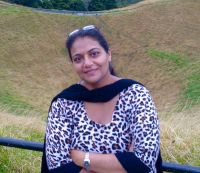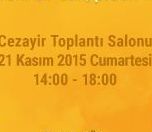“If a man kills a woman, it is a very ordinary incident.
“If you write a black man killed a white woman, then racism is involved.
“If you write a Muslim man killed a Christian woman then things get more serious because religion is also involved.
“If an Al Qaeda male member kills an American woman, then it means war”.
These words addressing to why war journalism is problematic belong to Dr. Rukhsana Aslam.
Aslam completed her PHD at New Zealand Auckland University of Technology on the subject “Peace Journalism”.
She has come to İstanbul for the peace journalism paneling, “Peace Journalism: A New Ethics, Practice and Education in Journalism” organized by IPS Communication Foundation under Peace Journalism Project undertaken with the financial support of Netherlands Consulate General in İstanbul to be held on November 21 at 2 p.m. at Cezayir Toplantı Salonu (Cezayir Meeting Hall).
"Clash is everywhere"
Why do we need peace journalism?
Peace journalism is closely related to present times. Today, there are clashes all over the world. I am not mentioning only international conflicts but also national and social conflicts within countries. We as audience are surrounded by these conflicts.
Peace doesn’t just mean end of war. It also means society being in harmony, and people being happy and safe. Peace means life. For this reason, not only war correspondents, but also education, economy and society correspondents too have a part in establishing peace.
What is the element that differs peace journalism from traditional journalism?
War journalism is of kind that escalates tension.
For instance;
If a man kills a woman, it is a very ordinary incident.
If you write a black man killed a white woman, then racism is involved.
If you write a Muslim man killed a Christian woman then things get more serious because religion is also involved.
If an Al Qaeda male member kills an American woman, then it means war.
They all have the same meaning but the words we use determine the effect of the story on people.
That is a sort of journalism encouraging war without considering consequences.
We as journalists have a responsibility for the society. It is true that we are not politicians, nor leaders. However, we have our pencils and platforms. There are people reading, watching, listening to us. For this reason, we might encourage them to think on the causes of the matters instead of giving emotional reactions as we report them the incidents.
"Initial obstacle before peace journalism is in mind of journalists"
When it comes to praxis, what are the obstacles before peace journalism?
Most journalists don’t know what peace journalism is. They see it as a sort of activism. They think it is something like becoming a member of a peace organization like International Amnesty and will lose its objectivity in this way.
In this regard, the biggest obstacle before peace journalism is in fact caused by the walls they put up in their own minds because people actually don’t know what peace journalism is.
When it comes to journalism, audience/reader takes place on the opposite side of this action. What is the importance of audience in implementation of peace journalism?
The audience are done with reading news of conflicts. People turn of their TVs when they see a conflict news because they enter conflict as soon as they take a step outside. Thus, people now want to know about cultures, dolphins, or James Bond. Conflict is past, but peace is present news.
Another point is that journalism today is dependent on official statements and done within four walls. What people think doesn’t take place in news. It is not possible to write about what people think by things you see in offices, Internet or TV. Hence, that is not journalism.
“Journalist should be creative, smart”
Media ownership should be questioned too as we talk about journalism within four walls. What kind of an impact do media owners have in peace journalism and extensification of it?
Whole media system is grounded on commercial. Media owners are not journalists. They are business people who desire to gain profit. Therefore, there is no meaning in asking them to change for the sake of peace journalism.
On the other hand, editors are journalists. They have been in the field earlier. We can educate them. That is what institutions like bianet do.
However, correspondents are already in the field. Editors don’t choose the words you use as you write your article. In the field, as you go live on TV, there is you on the one end of the microphone and audience on the other.
Who can stop you if you wish to speak the truth? Everything is concealed in the sentences you pick. Surely the institution for which you broadcast may have a stance but you as a person in the field has a chance to choose, has sentences to add to write the truth. What makes different the journalists like Robert Fisk that influence societies is this.
All these are related to choices. For some reason, today’s journalists including me are afraid of taking initiative, getting cross with governments, telling the truth. However, journalist should be smart, creative.
Just put peace activism aside. Peace journalism is in fact smart journalism. Journalists have the power to speak the truth and this power is the pen in their hands.
“Peace Journalism: A New Ethics, Practice and Education in Journalism” meeting to be led by Kadir Has University Faculty of Communication Dean Prof. Dr. Sevda Alankuş and Murat Çelikkan from Memory Center will be held on November 21, Saturday at Cezayir Toplantı Salonu (Cezayir Meeting Hall) in the hours between 2-6 p.m. The event is free of charge. (EA/TK)
Rukhsana Aslam |
She works as senior researcher at Pasific Media Center; peace journalism, media and conflict constitute her focus of research. She graduated from Punjab University, Department of English Literature and Department of Sociology. She carried on her English Literature MA program at the same university and received Master’s degree in are of International Journalism at City University in London. She worked for BBC, GEO TV and Pakistan’s most wide-spread newspaper in English, The News International, Rawalpindi until 2000. She served as head department of Faculty of Communication in Jinnah University and conducted the radio project of Voice of Women. She worked as head and advisor of media department in Hamrad and International Islam University in Pakistan. She did her PHD on peace journalism at Auckland University of Technology in 2014.
|
Click here to read the article in Turkish




.JPG)

132.jpg)
